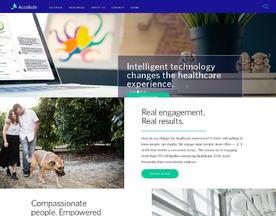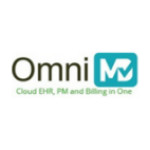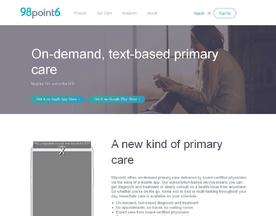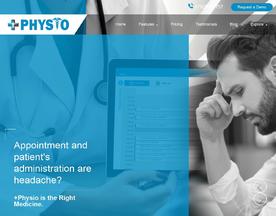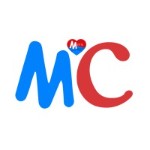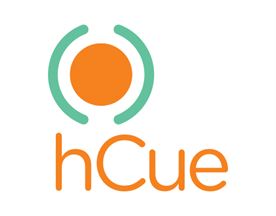In today’s fast-paced healthcare environment, it’s more important than ever for healthcare providers to efficiently manage their practices and provide high-quality care to their patients.
Practice management software is essential to help medical providers streamline their administrative tasks, manage patient information, and improve practice efficiency. A medical practice management system includes a range of features such as electronic health records (EHR), appointment scheduling, billing and invoicing, and patient portal.
In this blog post, we‘ll explore the key benefits and features of practice management software and share the top 5 medical practice management solutions based on our in-depth research.

Benefits of Practice Management Software for Healthcare
The right practice management solution provides several benefits that can help healthcare providers improve patient care and practice efficiency. There have been numerous studies on the benefits for both patients and other medical professionals, but here is a summary of the key areas PMS software:
Improved patient care and outcomes
Practice management software can improve patient care and outcomes by providing healthcare providers with quick access to patient information, including medical history, test results, and diagnoses. With this information readily available, providers can make more informed decisions about patient care and treatment. In addition, many practice management systems include tools for clinical decision support and patient education, which can help providers make more accurate diagnoses and improve patient understanding of their conditions.
Increased efficiency and productivity
Practice management software can automate many of the administrative tasks that healthcare providers face on a daily basis, including appointment scheduling, billing, and invoicing. By reducing the administrative workload, healthcare providers can spend more time focused on patient care and less time on paperwork. In addition, the software can help streamline communication and collaboration between healthcare providers and staff, which can further improve efficiency and productivity.
Enhanced communication and collaboration
Practice management software can provide a centralized platform for communication and collaboration between healthcare providers and staff. With features like secure messaging and shared calendars, healthcare providers can easily communicate and coordinate with each other, regardless of location. This can improve patient care by ensuring that everyone on the care team is up to date on patient information and treatment plans.
Reduced administrative workload
Practice management solutions can help healthcare providers reduce their administrative workload by automating many of the tasks associated with patient care and practice management. This includes appointment scheduling, billing and invoicing, and insurance and billing processes. By automating these tasks, healthcare providers can save time and reduce the risk of errors or omissions.
Increased revenue and profitability
By improving practice efficiency and productivity, practice management software can help healthcare providers increase their revenue and profitability. The software can automate billing and claims management, which can help reduce the time it takes to get paid. In addition, the software can provide analytics and reporting on practice performance, which can help healthcare providers identify areas for improvement and make data-driven decisions.
In the next section, we will explore some of the key features of practice management software for healthcare in more detail.

Key Features of Practice Management Software for Healthcare
Medical practice management systems typically includes several features that help healthcare providers manage their practices and provide high-quality care to their patients. Some of the key features are:
Electronic Medical Records (EMR)
EMR’s are digital versions of patient medical records that can be accessed securely and remotely by authorized healthcare providers. They contain information on a patient’s medical history, diagnoses, medications, allergies, and test results. EMR’s can help improve patient care by providing healthcare providers with quick access to patient information and facilitating communication and collaboration between healthcare providers.
Appointment scheduling
Appointment scheduling features enable medical practices to schedule patient appointments, send reminders, and manage cancellations and rescheduling. Some software can also automatically fill cancellations with waiting list patients. This feature can help healthcare providers improve patient satisfaction by reducing wait times and making it easier for patients to schedule appointments.
Medical Billing and Invoicing
Practice management software can automate billing and invoicing processes, including the submission of insurance claims, payment processing, and financial reporting. By automating these tasks, healthcare providers can reduce the risk of errors and ensure that they are getting paid for the services they provide. This feature can help healthcare providers save time and increase revenue.
Prescription Management
Prescription management features enable healthcare providers to manage patient prescriptions, including sending e-prescriptions directly to pharmacies, tracking medication orders and refills, and monitoring drug interactions. This feature can help improve patient safety and ensure that patients are receiving the right medications at the right time.
Patient Portal
Patient portals allow patients to access their medical records, communicate with healthcare providers, and request appointments or prescription refills online. This feature can help improve patient satisfaction and engagement by giving patients more control over their healthcare.
Reporting and Analytics
The software can generate detailed reports and analytics on patient data, including patient demographics, outcomes, revenue, and costs. This feature can help healthcare providers identify areas for improvement and make data-driven decisions about their practice.
In the next section, we will explore some popular practice management software options for healthcare providers.

Choosing a Medical Practice Management System
Choosing the right practice management software for your healthcare practice is a crucial decision that can have a significant impact on practice efficiency, patient care, and revenue. Here are some factors to consider when selecting practice management software:
Cost
The cost of practice management software can vary widely depending on the features and level of customer support provided. It’s important to consider the long-term costs of the software, including any ongoing maintenance fees, upgrade costs, and training costs. It’s also important to consider the return on investment (ROI) of the software and how it will impact practice revenue and profitability.
Scalability
Practice management software should be scalable and able to grow with your practice. It’s important to consider the size and complexity of your practice, as well as any future growth plans, when selecting software. The software should be able to accommodate multiple providers, locations, and specialties.
Customization
Practice management software should be customizable to meet the specific needs of your practice. It should be able to accommodate your practice workflow, patient population, and reporting requirements. Customization can help improve practice efficiency and patient care by providing a tailored solution that meets your specific needs.
Ease of use
Practice management software should be easy to use and intuitive, with a user-friendly interface and minimal training required. Complicated software can be a barrier to adoption and can lead to errors and decreased productivity.
Customer support
Customer support is an important factor to consider when choosing practice management software. The software vendor should provide ongoing support, training, and troubleshooting services. The level of customer support should be tailored to the needs of your practice and should be responsive and timely.
In the next section, we will explore some best practices for implementing and training staff on practice management software.

How We Choose the Best Medical Practice Management Software
Selecting the right practice management software for your healthcare practice can significantly impact patient care, efficiency, and revenue. With a variety of options available in the market, it can be challenging to choose the best one for your practice.
To simplify the decision-making process, we’ve conducted extensive research and analysis to identify the top medical practice management software companies in the industry.
Our methodology for selecting the best medical practice management software vendors is based on several key factors. First, we considered the functionality and features offered by each software, including electronic Medical record (EMR) capabilities, appointment scheduling, billing and invoicing, prescription management, patient portal, and reporting and analytics. Second, we evaluated the user interface and ease of use, as well as the level of customization and integration with other tools.
We analyzed customer reviews and feedback on platforms such as Serchen, G2, and Capterra to gauge user satisfaction and the level of support provided by each vendor. Additionally, we took into account the pricing and affordability of each solution, as well as the level of customer service and support offered.
5 Best Medical Practice Management Software Providers
Using the above methodology, we have identified the top medical practice management software companies that stand out in terms of their features, usability, customer satisfaction, and value for money.
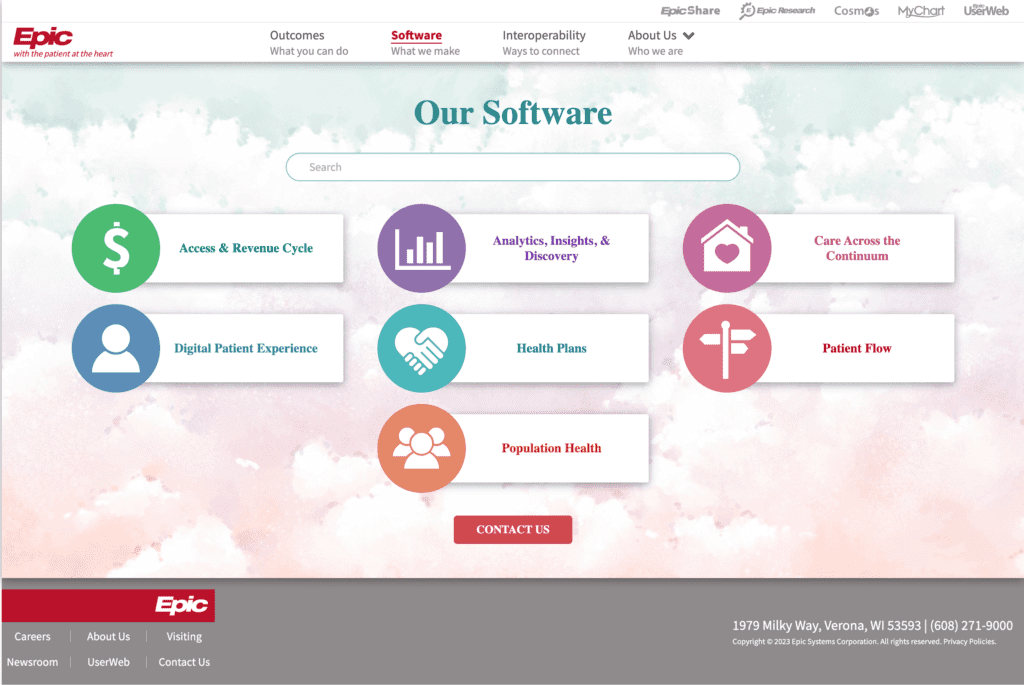
Epic Systems
Epic Systems Corporation is a software company that provides healthcare organizations with electronic health record (EHR) software and practice management software. Their software is used by many large healthcare organizations and academic medical centers in the United States, and they are known for their comprehensive features, scalability, and interoperability with other systems. Their EHR software includes features such as clinical decision support, medication management, and patient engagement tools.
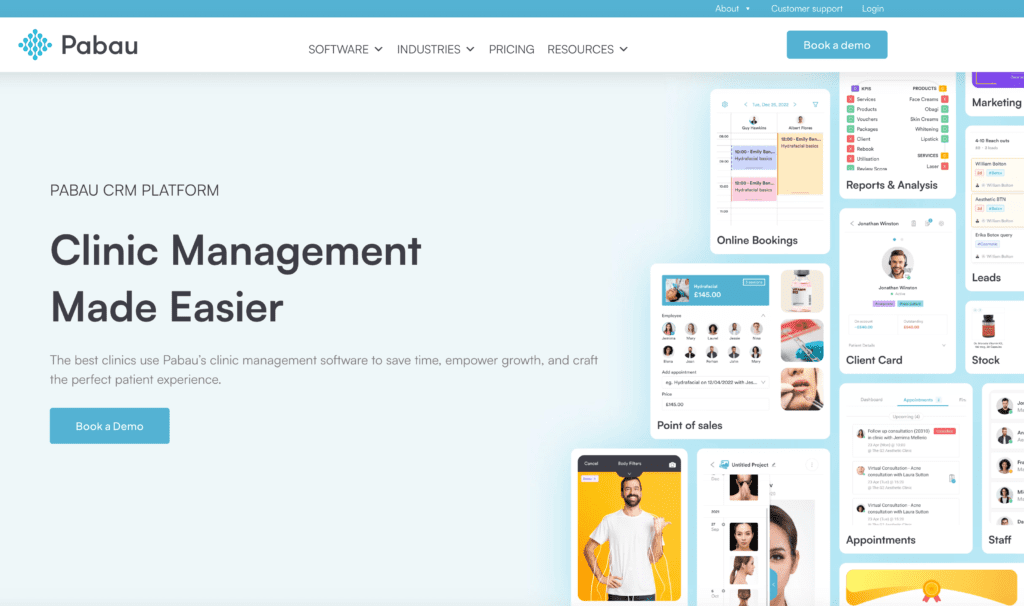
Pabau
Pabau is a software company that provides practice management software for healthcare providers, primarily in the fields of cosmetic, aesthetic, and dental medicine. Their software includes features such as appointment scheduling, online booking, patient records management, and marketing automation. They are known for their user-friendly interface and customizable features that can be tailored to meet the specific needs of a healthcare practice.

Luma Health
Luma Health is a software company that provides patient engagement and communication software for healthcare providers. Their software includes features such as automated appointment reminders, waitlist management, and patient feedback tools. They are known for their easy-to-use interface and ability to improve patient satisfaction and practice efficiency.

Splose
Splose is a software company that provides practice management software for mental health practitioners. Their software includes features such as client management, appointment scheduling, session notes, and invoicing. They are known for their customizable templates and user-friendly interface, which can help mental health practitioners streamline their administrative tasks and improve patient care.
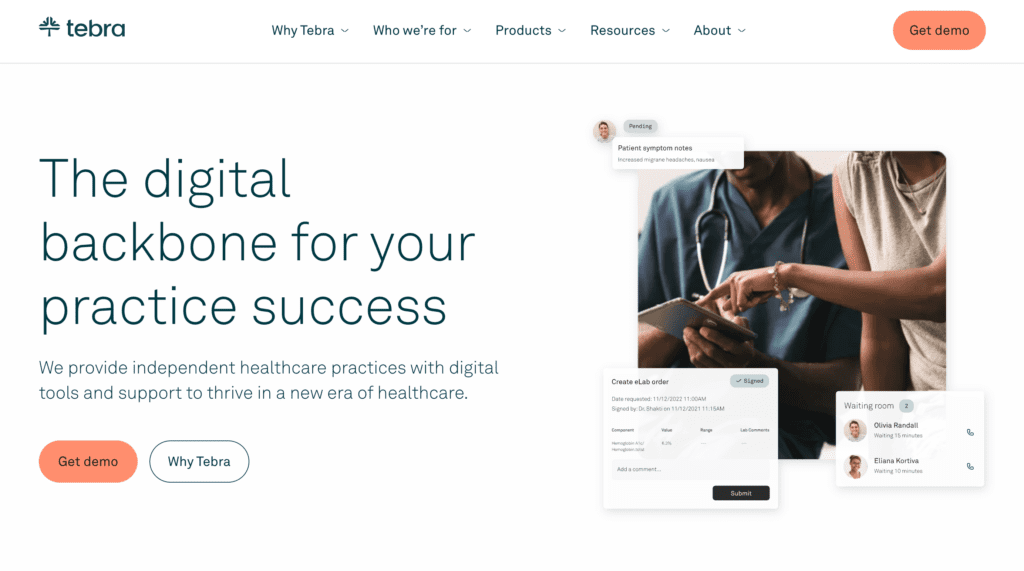
Tebra
Tebra is a software company that provides practice management software for chiropractors and other healthcare providers. Their software includes features such as appointment scheduling, patient management, billing and invoicing, and marketing tools. They are known for their easy-to-use interface and affordable pricing, which can make it a good option for smaller practices.
Each of these software vendors has its own set of features, pricing, and customer support options. When choosing practice management software, it’s important to evaluate the specific needs of your practice and compare multiple options to find the best fit.

Medical Practice Management Software – FAQ
What is practice management software for healthcare?
Practice management software for healthcare is a type of software that helps healthcare providers manage their practices and patient care more efficiently. It typically includes features such as electronic medical records (EMR), appointment scheduling, billing and invoicing, prescription management, patient portal, and reporting and analytics.
What are the benefits of practice management software for healthcare?
Practice management software can provide several benefits for healthcare providers, including improved patient care and outcomes, increased efficiency and productivity, enhanced communication and collaboration, reduced administrative workload, and increased revenue and profitability.
How do I choose the right practice management software for my healthcare practice?
When choosing practice management software, it’s important to consider factors such as cost, scalability, customization, ease of use, and customer support. It’s also important to evaluate the specific needs of your practice and how the software will impact practice efficiency, patient care, and revenue.
What are some examples of practice management software for healthcare?
There are several practice management software options available for healthcare providers, including Epic Systems Corporation, Cerner Corporation, and NextGen Healthcare. Each software option has its own set of features, pricing, and customer support.
How do I implement and train staff on practice management software?
Proper implementation and training are crucial for the successful adoption of practice management software. Best practices include onboarding a dedicated implementation team, conducting comprehensive training sessions, providing ongoing support and troubleshooting, and regularly evaluating and optimizing the software.

Wrapping things up!
In conclusion, medical practice management software can be a valuable tool for healthcare providers looking to improve patient care, streamline operations, and boost financial performance.
We’ve discussed the key benefits of practice management software, including electronic health record capabilities, appointment scheduling, billing and invoicing, prescription management, patient portal, and reporting and analytics.
In our research, we have identified five leading medical practice management software vendors: Epic, Pabau, Luma Health, Splose, and Tebra. These vendors offer a range of features and functionalities, and have received positive customer reviews for their user-friendliness, customer support, and affordability.
By choosing the right medical practice management software for your healthcare practice, you can optimize your operations, improve patient outcomes, and enhance your financial performance. We encourage you to consider the vendors we’ve highlighted and to evaluate them against your unique needs and requirements to make an informed decision for your healthcare practice.


